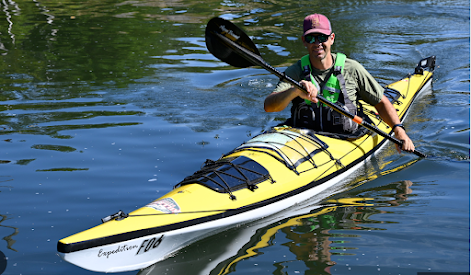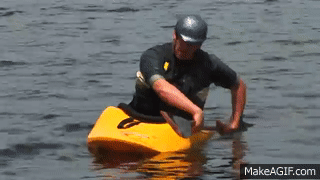It all started with the Inuit people in the very - I mean REALLY northern parts of the world, Canada, Siberia and such places where light and maneuverable kayaks have been used for thousands of years.
These boats were covered in skin, and were light enough to be carried by a single person. The kayaks were largely used for hunting walrus and seal, and were hung upside-down when not in use, high enough that the hunters' dogs couldn't chew the skins. Even today, people hate it when their dogs chew their kayaks.
Nowadays, however, the skin thing is considered pasé, and most kayaks are made from roto-molded high-density polyethylene or fiberglass. That's where the similarity ends and the wild variety begins.
A very common type of boat is the "sit-on-top" kayak (also known as the "fall-off-top" kayak). They are easy to use, and if you fall off, as sometimes happens, you merely climb back on, minus your wallet, car keys, sunglasses, iPhone and dignity.
Sea kayaks are graceful, slender craft meant for distance travel, slicing smoothly through the water with minimal exertion, complete with watertight compartments for stowing your gear. They can be considered the S-class Mercedes of the watery world, often with pedal-operated rear rudders.
Then there are the whitewater boats. These are made for doing potentially stupid things. Like waterfalls.
or giant waves on seriously crocodile-infested rivers,
or maneuvers that in the end really don't impress the chicks.
If the sea kayaks are the upper-class limos, whitewater boats are the desert-rat off-road warriors.
About the only things that whitewater boats have in common with their more-civilized cousins are a) they float in water, b) they are propelled with a paddle, and c) their opening is made watertight by a skirt. The latter is important in either situation. As my brother says, "Real men wear skirts."
If you are serenely paddling your upper-crust sea kayak on the Inner Passage of Alaska and an orca rudely upsets your craft, or you get tossed by a standing wave on the Upper Gauley in your beat-up whitewater boat, your skirt keeps the water out and helps keep you in, but.... you eventually should get upright again.
This is where the "Eskimo roll" or just "roll" comes in, allowing you to get right-side up.
When my sons were growing up, they couldn't come on the annual Spring Break "Big Boy Kayak Trip" with their cousins and uncles until they could successfully roll a kayak.
Everyone would hold their breath when the newbie capsized on the river, and then cheer wildly when he came upright, having hit his first "combat" roll. The penalty for not hitting the roll was having to pop the skirt and bail out, necessitating a "yard sale," as everyone collected the paddler, his paddle, his lunch and his now-flooded boat as they bobbed down through the rapids.
Sadly, I haven't been on a river in years in my whitewater boat, which can be more accurately described as a '96 Subaru with a lift kit than a sleek European sedan.
I brought it to a youth summer camp on a lake near Raleigh last summer. I was assigned to be the on-the-water cop during canoe time, chasing miscreants who were wandering out of sight, helping with capsized canoes and participating in paddle-splashing fights, which I always won, by the way.
Lots of fun, but I was shaken by missing a couple of roll attempts near shore and having to bail out. It has been a dumb little thing on my mind's back burner since then. Am I getting too old for such things? (Obvious answer - Yes.)
One of Raleigh City's Parks and Rec pools is covered in the winter, and used by the public and the nearby high school swim teams.
On Friday evenings between New Years and Easter, the swimmers are pushed aside and the pool is opened to boaters.
Last Friday night, I shoved my kayak, paddle, skirt, life vest and eight dollars in the macho minivan and headed for the Optimist Pool, not very optimistic about my kayak rolling ability. I went early to avoid the public shaming that would result if I couldn't get my roll back.
After slithering into my boat and siding off the edge of the pool, I paddled around for a bit and chatted up a couple of guys in their S-class Mercedes and Lexus sea kayaks. Realizing I had to do it, I paddled out in a clear space and rolled over.
And I rolled back up! Reasonably smoothly! (At least from an underwater point of view.) But the next twelve attempts were successful, and some even looked OK!
Oh, man was I relieved! As the hard-core guys started strolling in with their little trick boats to warm up, I said a silent prayer of thanks and crawled out of mine. I dried off and carried my wet gear back to the minivan and drove home happily.
I hope that you, too can still hit your kayak roll, or your triple axel on the ice, or your backside tailslide on your skateboard or whatever before age catches up, which, sadly, it always will.
Yeah, but until then...
Dave












